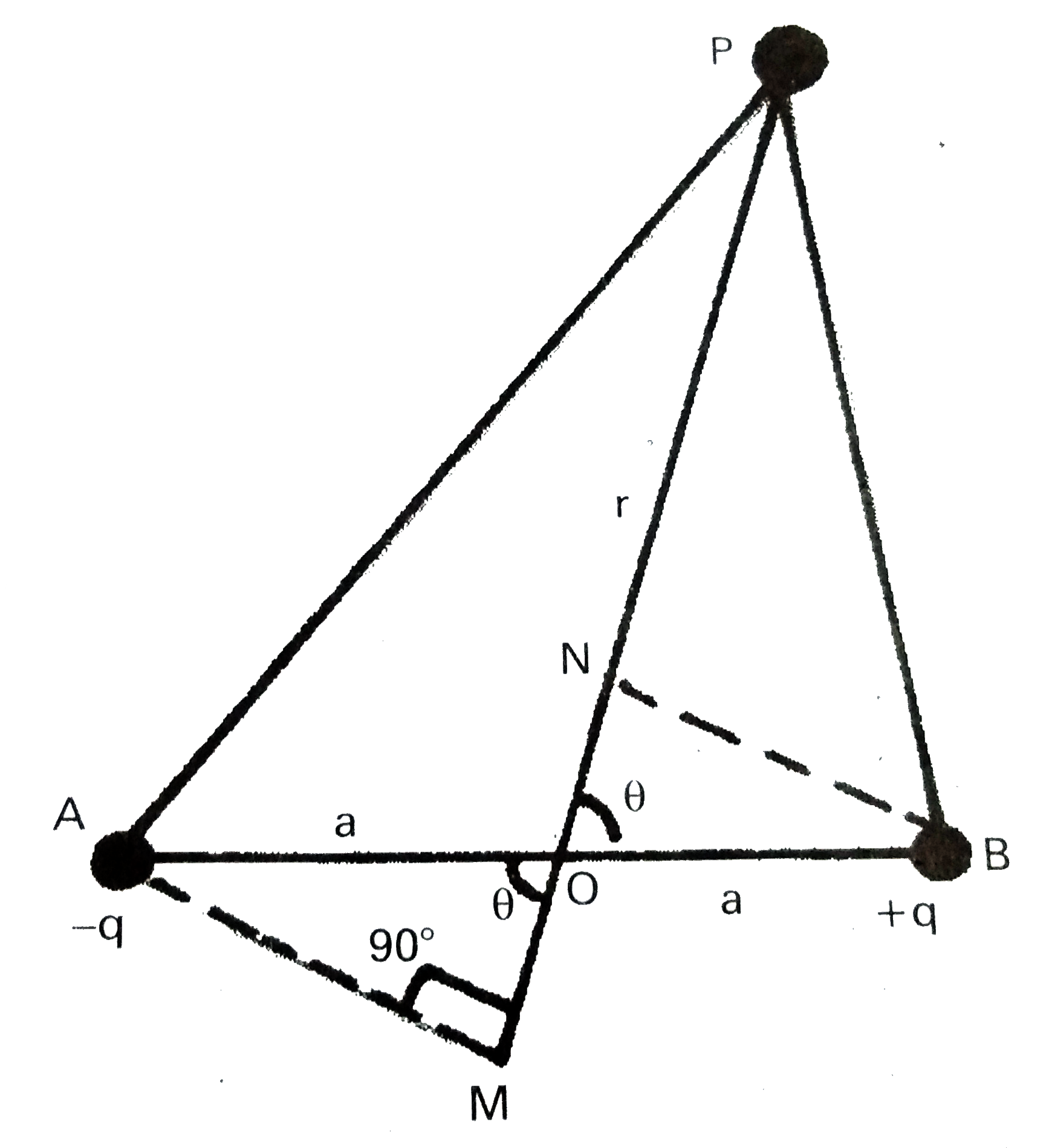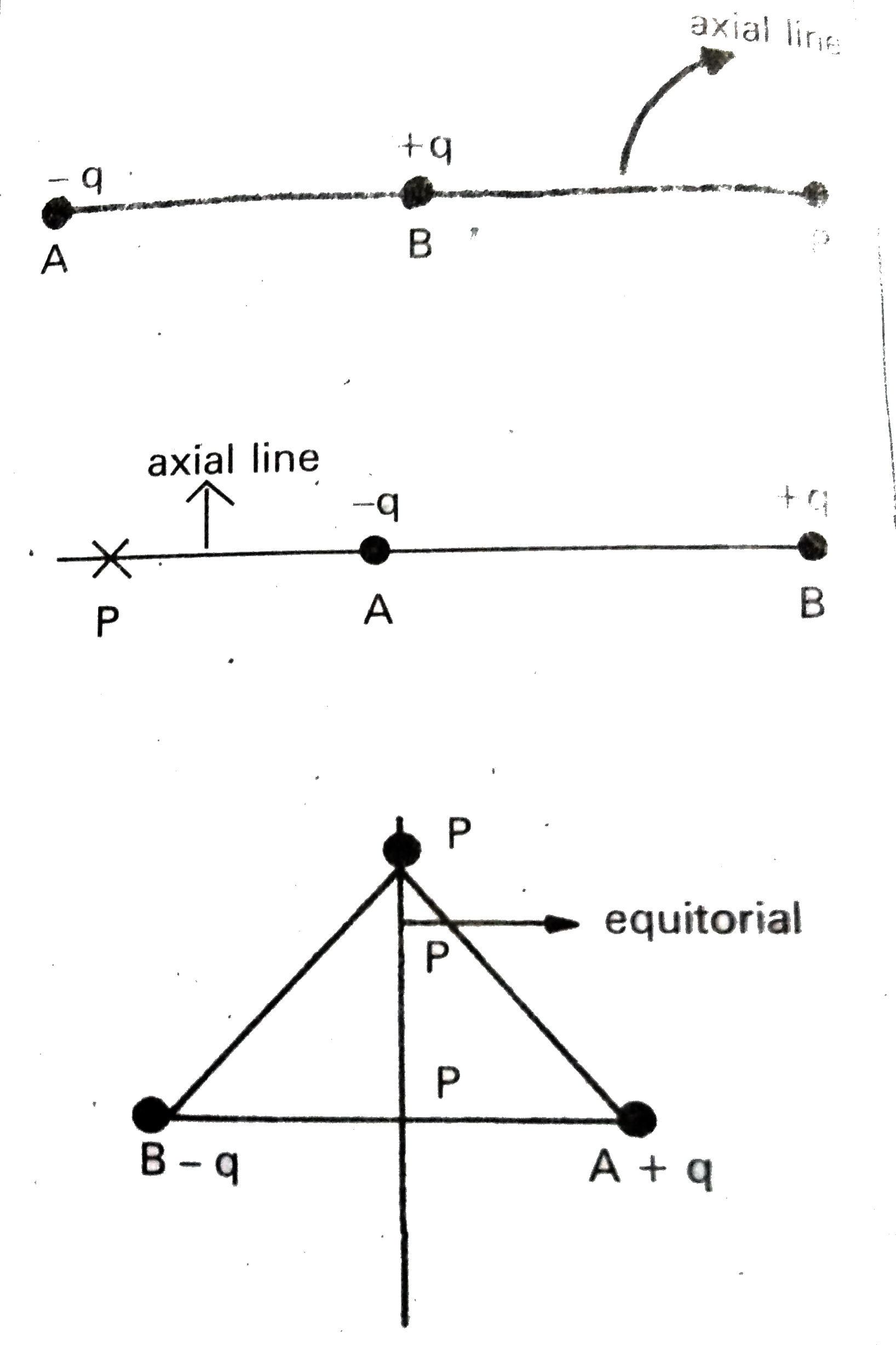Saved Bookmarks
| 1. |
Define electric potential. Derive and expression for the electric potential due to an electric dipole and hence the electric potential at a point (a) the axial line of electric dipole (b) on the equatorial line of electric dipole. |
|
Answer» Solution :Electric potential (V): The workdone by a unit positive charge from infinite to a point in an electric field called electric potentials. 1. Consider A and B having -q and +q charges separated by a distance 2a. 2. The electric dipole moment `P=qxx2a` along AB. 3. The electric potential at the point 'P' is to be CALCULATED. 4. P is at a distance 'r' from the point 'O'. `theta` is the angle between the line OP and AB. 5. BN and AM are perpendicular to OP. 7. Potential at P due to charge `-q at A, V_2=(1)/(4 pi epsi_0)[(-q)/(AP)]` `therefore V_1=(1)/(4pi epsi_0)[(-q)/(MP)][because AP=MP]`  8. Therefore , Resultant potential at P is `V=V_1+V_2` `V=(1)/(4piepsi_0)[(q)/(NP)-(q)/(MP)]`..............(1) 9. In `Delta le ONB,ON=OB cos theta =a cos theta, therefore NP=OP -ON=r-a cos theta`............(ii) 10. In `Delta le AMO,OM=AO cos theta=a cos theta, therefore MP=MO+OP=r+a cos theta`............(3) 11. SUBSTITUTING (2) and (3) in (1) , we GET `V=(1)/(4 pi epsi_0)[(q)/(r-a cos theta)-(q)/(r+acos theta)]=(q)/(4 pi epsi_0)[(2acos theta)/(r^2-a^2cos^2theta)]` `therefore V=(P cos theta)/(4pi epsi_0(r^2-a^2cos^2theta))[because P=2aq]` 12. As ` r gtgt a , a ^2cos^2 theta` can be neglected with comparision of `r^2`. `therefore V=(Pcos theta)/(4pi epsi_0r^2)` 13. (a) Electric potential on the axial line of dipole : (i) When `theta=0^@`. Point p line on the side of `+q` `therefore V=(P)/(4piepsi_0r^2) [because cos 0^@=1]` (ii) When `theta=180^@`, point p lies on the side of -q . `therefore V=(-P)/(4piepsi_0r^2) [because cos 180^@=-1]` (b) Electric potential on the equitorial ine of the dipole : when `theta=90^@`, point P lies on the equitorial line. `therefore V=0 [ because cos 90^@=0]`. 
|
|
Discussion
No Comment Found
Related InterviewSolutions
- A wire is bent to form a semicircle of the radius a. The wire rotates about its one end with angular velocity omega . Axis of rotation is perpendicular to the plane of the semicircle . In the space , a uniform magnetic field of induction B exists along the aixs of rotation as shown in the figure . Then -
- A massless non conducting rod AB of length 2l is placed in uniform time varying magnetic field confined in a cylindrical region of radius (R gt l) as shown in the figure. The center of the rod coincides with the centre of the cylin- drical region. The rod can freely rotate in the plane of the Figure about an axis coinciding with the axis of the cylinder. Two particles, each of mass m and charge q are attached to the ends A and B of the rod. The time varying magnetic field in this cylindrical region is given by B = B_(0) [1-(t)/(2)] where B_(0) is a constant. The field is switched on at time t = 0. Consider B_(0) = 100T, l = 4 cm(q)/(m) = (4pi)/(100) C//kg. Calculate the time in which the rod will reach position CD shown in the figure for th first time. Will end A be at C or D at this instant ?
- A concave lens with equal radius of curvature both sides has a focal length of 12 cm. The refractive index of the lens is 1.5. How will the focal length of the lens change if it is immersed in the liquid of refractive index 1.8 ?
- If the tempearture of black body is raised by 5%, the heat energy radiated would increases by :
- What are the co-ordinates of the image of S formed by a plane mirror as shown in figure?
- The direction of ray of light incident on a concave mirror is shown by PQ in Fig. The direction in which the ray would travel after reflection is shown by four rays marked 1, 2, 3 and 4. Which of the four rays correctly shows the direction of reflected ray?
- What is meant by polarisation ?
- Two concentric coils each of radius equal to 2πcm are placed right angles to each other. If 3 A and 4 A are the currents flowing through the two coils respectively. The magnetic induction( in Wb m^(-2) )at the center of the coils will be
- Assertion: Out of ""_(1)He^(3) and ""_(7)He^(3), the binding energy of ""_(1)He^(3)is greater than ""_(2)He^(8). Reason: Inside the nucleus of""_(1)H^(3), there is more repulsion than inside the nucleus of ""_(2)He^(4).
- In which accelerated motion, K.E of the particle is constant